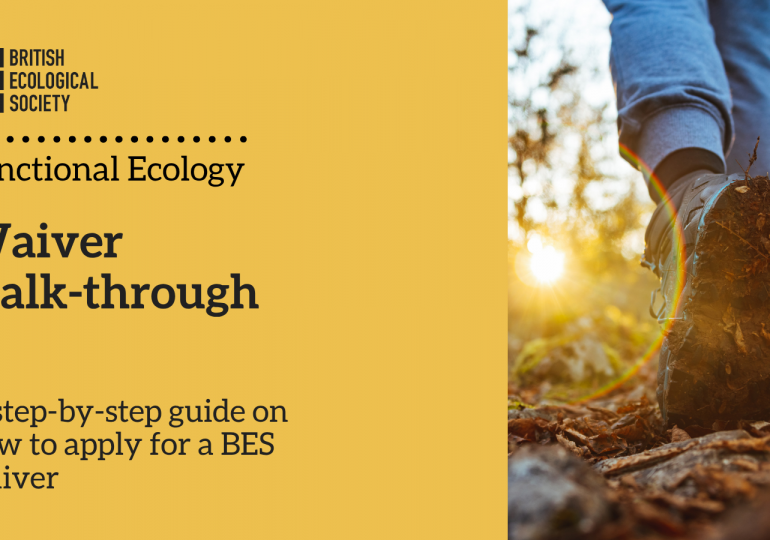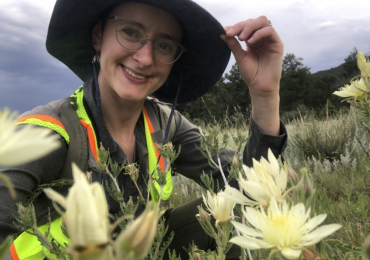Although there are more transformative agreements than ever that cover the cost of article publication charges (APCs) in Gold Open Access (OA) journals, at the British Ecological Society (BES), we know that these are not available to all authors. That’s why we offer BES waivers for authors without funding to publish open access. In this blog post, we discuss OA, explain what a BES waiver is and provide a step-by-step guide on how to apply for one.
What is a Gold OA Journal?
A Gold OA journal is one in which all articles are permanently free to read and which anyone has the right to share, download or distribute. Because all articles are free, there are no subscription costs to readers, an APC is therefore paid by the Corresponding Author to cover the costs of publication and distribution. This differs from hybrid journals, in which authors can either choose to publish their articles OA and pay an APC or publish them behind a paywall, usually with no or limited costs.
Which of the BES journals are OA?
Of the BES’ seven journals, four are gold OA:
Ecological Solutions and Evidence
Functional Ecology
Methods in Ecology and Evolution
People and Nature
The APCs on each of these journals differ, but the BES waiver process is the same for all of them. BES waivers are only available for articles published in our gold OA journals; they cannot be used to fund OA publishing in our hybrid journals Journal of Animal Ecology, Journal of Applied Ecology, and Journal of Ecology.
What funding can be available to authors to cover the cost of an APC?
There are various possible sources of funding to cover the cost of an APC in our Gold OA journals, including:
Research4Life, which partners with Wiley to grant automatic waivers and discounts to researchers based in low- and middle-income countries.
Transformational or Transitional agreements between our publishing partner, Wiley, and funders/institutions to cover the cost of the APC for affiliated authors. A list of these, by country, can be found here.
Research grants, which can mandate or include provisions for OA publishing.
Open Access Pricing Power Parity Pilot, a Wiley initiative to provide country-specific APC discounts for researchers based in affiliated Latin-American institutions. You can find a list of countries included in this pilot, along with the relevant discount here.
What if none of these funding options apply?
The BES recognises that authors of some papers do not have external, national or institutional funding to cover the cost of an APC. These authors can apply for a BES waiver, which covers the full cost of the APC. BES waivers are available to all authors without funding for publication in a gold OA journal. This could include:
Authors at institutions without transformational agreements for OA publishing AND without funding specifically for APCs.
Authors who are not affiliated with an institution (including people outside of academia or between positions)
Authors from a Research4Life group B country who do not have funding to cover the remaining cost of the APC.
Authors whose current role does not including research provisions (retired or emeritus researchers, authors at primarily teaching institutions or whose employment only covers their teaching work, etc.).
How do I know if I have funding?
Here are some tips about how to check whether funding is available from your institution to cover the APC and, if not, how to evidence this when applying for a BES waiver:
Ask your funder to confirm that research grants that supported the work described did not included funding to cover the APC: If your funder has an OA mandate, the BES expects that the article’s APC will be paid directly, unless covered by an agreement between the Corresponding Author’s institution and Wiley. When applying for a BES waiver we therefore need to see confirmation that your research grant did not include funding to cover the APC. This can include written confirmation, like an email, from your funder, or a copy of the grant if it outlines where the funding was directed.
Check with your institution to see if there are any existing agreements in place to cover the APC: The Corresponding Author’s institution will likely know if there are agreements in place with Wiley to cover the cost of the APC, so it’s a good idea to check with your institution’s librarian, course administrator, or head of department and ask what funds are available. If there is no institutional funding available, forward us any emails from the institution that explain this
Independent researchers who are not affiliated with an institution can apply for a BES waiver by demonstrating this, for example:
A letter from your employer, confirming that you are not affiliated with an institution and that do not have OA funds.
A LinkedIn profile or CV that shows that you are an independent researcher.
Applying for a BES waiver
We’ve made the application process for a BES waiver as simple as possible. The Corresponding Author is responsible for covering the costs of publishing, therefore it must be them who applies for a BES waiver. To do so, we need to see the following:
Confirmation that any research grant that supported the work described did not include funds for APCs.
The steps that the Corresponding Author has taken to find support for APCs and documentation that they have been unsuccessful.
Any further supporting evidence that funding for APCs is unavailable, for example:
A link to an institution or publisher OA page demonstrating that there is no funding for OA publishing.
Evidence that a researcher is not covered by institutional OA provisions, for example, if they are a visiting researcher.
Forward evidence of the lack of APC funding to the editorial office of the journal you wish to apply to. This email could take the following format:
Dear [JOURNAL] Editorial Office,
I am emailing you to apply for a BES waiver for my article [TITLE] in [JOURNAL NAME]. Please see confirmation from [the funder and/or my institution/employer] that the grants supporting this research did not cover the APC, and that institutional funding is unavailable. Please let me know if you need any further information
Best wishes,
[CORRESPONDING AUTHOR]
This email will be forwarded to the journal’s Managing Editor, who will either approve or decline the waiver request. The journal’s editorial office will be in touch with the outcome as soon as they can.
Read our full waiver policy here.
Please get in touch with us if you have any questions!
Leave a comment






